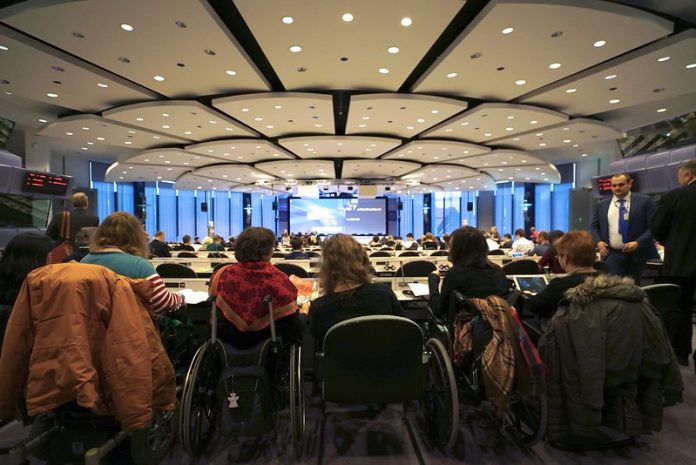Members of the Employment and Social Affairs committee agreed on a report on the participation of persons with disabilities on the labour market.
The report stakes stock of the progress made by the EU on the implementation of the UN Convention on persons with disabilities (UNCRPD) in the field of employment. The UNCRPD is binding upon the EU institutions and the Member States. Persons with disabilities have the right to fully participate on the labour market but face many difficulties in actually achieving an equal position at work. MEPs therefore call on the member states to ensure reasonable accommodation for employees with disabilities in the workplace, based on individual needs, and to provide relevant training for employers. Member states should take active measures to safeguard the accessibility of workplaces, transport and of the built environment. MEPs also want member states to examine the introduction of compulsory workplace diversity quotas. The European institutions should lead by example, MEPs say, by setting a diversity quota for recruiting people with disabilities, and employing persons with all types of disabilities at all levels. The report calls on the Commission and the Member States to harmonise the definition of disability and to ensure mutual recognition of disability status across Member States to ensure the free movement and the enjoyment of their EU citizenship rights. In some Member States, persons with disabilities mostly work in sheltered workshops, which constitute a closed work environment. MEPs insist that employees working in these workshops should be protected by an employee status, labour rights and a guaranteed minimum wage and insist that this type of work should always serve as a transition to the open labour market. In order to improve access to the open labour market for persons with disabilities, lifelong learning and skills development, in particular green and digital skills, are essential, MEPs say. The non-binding report was approved on Wednesday by 47 votes in favour, 1 against and 4 abstentions.
The Convention on the Rights of Persons with Disabilities was adopted on 13 December 2006. The EU became a party to the UNCRPD in December 2010, with the Convention coming into force for the EU in January 2011 The Convention is intended as a human rights instrument with an explicit, social development dimension. It adopts a broad categorization of persons with disabilities and reaffirms that all persons with all types of disabilities must enjoy all human rights and fundamental freedoms.In the EU, 50.6 % of persons with disabilities are in employment compared with 74.8 % of persons without disabilities. These statistics exclude people living in institutions or who are considered unable to work. 29.5% of women and 27.5% of men with disabilities are at risk of poverty and social exclusion in the EU compared to 22.4% of the entire population. Persons with disabilities are more likely to face in-work poverty than those without disabilities (11% versus 9.1%) due to the extra costs related to their disability.

